人教版八年级英语上册Unit 1 Section B (1a-1e) 教学课件
人教版英语八年级上册 Unit 1 Where did you go on vacation Section B (1a-1e)
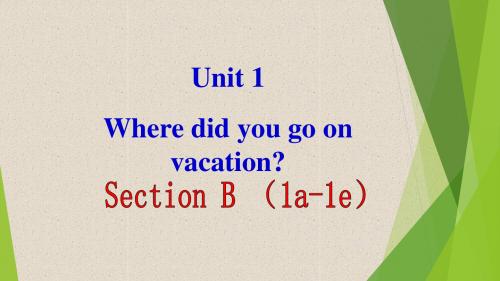
went to the Great Wall
went to New York City
went to the mountains
How was the bus trip? It was relaxing.
How was the museum? It was boring.
How was the beach? It was beautiful.
Unit 1
Where did you go on vacation?
Language Goals
Use the adj. to describe the feelings.
Understand that other people talk about their vacations.
Warming-up:
Where did you go on vacation? What did you do?
1a Match the words with the pictures below.
1. f delicious
2. a expensive 3. c exciting
4. e cheap 5. b terrible 6. d Boring
2. Did she do anything special there? What was it?
_S_h__e_w__e_n_t_t_o__a__fu__n__p_a_r_k_.__It__w_a__s_r_e_a_l_ly_____
_e_x_c_i_t_in__g_. _
3. Did she buy anything for her best friend? ___Y_e_s_, _s_h_e_d_i_d_._______________________
Section B 1a—1e 初中八年级上册英语教案教学设计课后反思
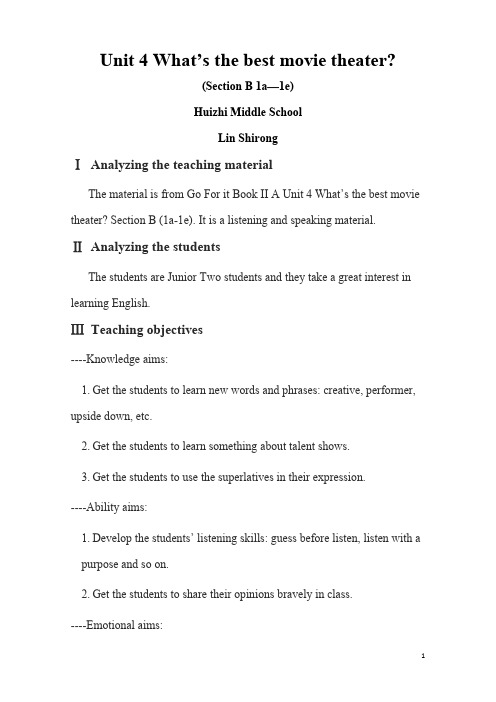
Unit 4 What’s the best movie theater?(Section B 1a—1e)Huizhi Middle SchoolLin ShirongⅠAnalyzing the teaching materialThe material is from Go For it Book II A Unit 4 What’s the best movie theater? Section B (1a-1e). It is a listening and speaking material.ⅡAnalyzing the studentsThe students are Junior Two students and they take a great interest in learning English.ⅢTeaching objectives----Knowledge aims:1.Get the students to learn new words and phrases: creative, performer, upside down, etc.2.Get the students to learn something about talent shows.3.Get the students to use the superlatives in their expression.----Ability aims:1.Develop the students’ listening skills: guess before listen, listen with a purpose and so on.2.Get the students to share their opinions bravely in class.----Emotional aims:1.Get the students to know everyone is good at something and try to make their dreams come true.2. Get the students to try to be a talented and confident person.ⅣTeaching key points1.Get the students to grasp the key words and key phrases.2.Get the students to develop the listening skills and try to express their ideas by using the superlatives.ⅤTeaching Difficult pointsGet the students to use superlatives in practice and try to be a talented and confident person in their daily life.ⅥTeaching methods1.Tasked-based teaching and learning method.municative teaching metho d.3. Audio visual teaching method.ⅦTeaching aidsMultimedia facilities, blackboard , PPT.ⅧTeaching proceduresStep one: Lead-in1. Greetings and free talk.2. Choose the Huizhi Talent for this year. Watch the videos of students’ talent shows. And then ask the students to work in pairs andchoose the best talent show and give their reasons.【Design purpose:The talent show videos are chosen from the students in our school. It is designed as the lead-in part due to the following three functions: 1. Situational function: students can imagine themselves as judges for the talent shows, which can arouse their interests immediately. 2. Practical function:by using the material they are familiar with, students are supposed to use the superlatives they have learnt in practice. 3. Cooperation function: through the pair work, students can learn to cooperate with each other.】Step Two:Presentation and ProductionActivity 1: Exercise of 1a.Write these words and phrases next to their opposites in the chart.【Design purpose: Through this exercise, students are expected to review the changing rules of the superlatives learnt in previous classes.】Activity 2: Games1. Say it quickly. Show the adjectives on the balloons. Ask all the students to stand up and say the superlatives of the adjectives as quickly as they can.2. The magic hand. Say the opposite forms of the superlatives. Encourage all the students to take part in the games.【Design purpose: Games can not only make the atmosphere alive,but also help the students to consolidate what they have learnt in a way they are interested in.】Activity 3: Listening1. Pre-listening activity1) Prediction: Show pictures of different talent shows together and ask the students to guess the main idea of the passage.【Design purpose:Prediction is a good listening skill. It reduces the difficulties and paves way for later tasks.】2) Talk about the pictures: Look at the pictures and talk about the talent shows in each picture.【Design purpose: Through the process, students are expected to learn the new words they are going to hear in the listening material, which reduces the obstacles in the following activities.】2. While-listening activity1) Listen and match.(1c) Listen to people talking about a school talent show. Match the pictures with the performers.【Design purpose:Students are supposed to match the people and their talent shows, which help them to have a further understanding of the listening material.】2) Listen and choose.Question 1: Why did they think Dennis was the worst?A. He kept dropping the balls.B. His performance was not interesting.C. He could not sing very well.Question 2: Vera was the most creative because _______.A. She was very funny.B. She played the guitar upside down.C. She was an excellent piano performer.【Design purpose:It is a process of careful listening. Students are required to pay special attention to the superlatives used for certain people, which makes the later exercise of 1d more easy.】3) Listen and fill.(1d) Listen and fill in the chart with the adjectives you hear.【Design purpose: In this part, students are required to take notes by paying attention to the superlatives and adjectives while listening. 】4) Listen and role playFill in the blanks with the correct answers and then role play the conversation.【Design purpose:It helps students to consolidate what they have listened and then improve their spoken English through role play.】3. Post-listening activity : Who’s the most talented in our class?After listening to the material, divide the students into group of four. Ask them to choose the most talented students in our class for the next Huizhi Talent.【Design purpose:On the one hand, it helps students to learn to cooperate with each other through group discussion; on the other hand, the topic they discussed echoes the lead-in part of this lesson.】。
人教版英语八年级上册教案:Unit1 SectionB(1a-1e)

Unit1 SectionB(1a-1e)教案【教材版本与册数】新目标人教版八年级上册【单元名称】Unit 1 Where did you go on vacation ?【课时】SectionB 1a-1e(第3课时)【课型】Listening and Speaking(听说课)教材分析本单元围绕“节日和假日( holidays and vacations)”这一话题,展开形式多样的听、说、读、写学习活动。
能正确使用一般过去时和不定代词的用法来询问及叙述假期活动和谈论度假的感受。
本单元Section A通过谈论假期活动,首先复习、巩固对一般过去时的理解和运用,侧重与假期活动有关的词汇和语言结构的学习,以及该话题下的听说训练。
Section B 进一步拓展了此话题,由对假期活动的询问及叙述转向描述及谈论度假的感受;在语言上,除进一步综合训练、巩固sectionA所学重点语言内容外,学习正确、得体地运用相关形容词描绘假期活动,表达自己的感受成为这一部分的一项重要任务;在语言技能上,则由听、说转向综合性地听、读、写的训练。
通过本单元的学习使学生学会用得体的语言询问及叙述假期活动和谈论度假的感受,了解国内外著名游览胜地。
此部分1a-1e通过听说活动拓展单元话题,拓展和巩固了目标语言的运用。
1a-1b是听前的图文匹配练习,邀请学生将图片内容与相应的形容词匹配,并且找到成对的反义词delicious----terrible, expensive---cheap,exciting---boring;1c-1d为听力练习,其内容依然是度假,但信息更丰富,谈到对事物的看法和感受。
1e活动听力的延续,让学生将听到的信息用据“wh-”疑问词的提示串成一段话来完整的故事描述,进行语言输出。
(一)语言知识目标:1 / 15第 1 页教学目标1.语音、词汇:通过听前的活动,学生能够分辨描述性的形容词感情色彩。
delicious, expensive, exciting, cheap, terrible, boring2.语法:能正确使用一般过去时和不定代词的用法来询问及叙述假期活动和谈论度假的感受。
人教版英语八年级上册Unit1SectionB1a-1e教案与反思

教案满招损,谦受益。
《尚书》
原创不容易,【关注】,不迷路!
【素材积累】
海明威和他的“硬汉形象”美国作家海明威是一个极具进取精神的硬汉子。
他曾尝试吃过蚯蚓、蜥蜴,在墨西哥斗牛场亮过相,闯荡过非洲的原始森林,两次世界大战都上了战场。
第一次世界大战时,19岁的他见一意大利士兵负伤,便冒着奥军的炮火上去抢救,结果自己也被炸伤了腿,但他仍背着伤员顽强前进。
突然间,炮击停止,探照灯大亮,海明威终于回到阵地。
原来是他的英勇行为感动了奥军将领,下令放他过去。
新人教版八年级英语上册教案:Unit 1 where did you go…(第4课时)

八年级Unit 1 Where did you go on vacation?Section B 1a-1e (Period four)Teaching and learning Goals:一、功能:Talk about last vacation activities; Describe vacation activities using adjectives and express personal feelings.二、词汇和常用表达:Learn to use words and sentences: “delicious, terrible, cheap, expensive, exciting, boring, sb. went to ------. How was / were ------? It was / They were------! Did you ------? Did everyone have a good time? Everything was excellent.”三、学习策略:Learn to sum up the main patterns and communicative phrases of the tape scripts; Improve listening and speaking skills by pair work and group work.四、文化知识:Help students to know about Hong Kong.Pre-listening activitiesReviewMake a survey. Ask the students to ask their classmates the questions. Where did you go on vacation? Did you go there with anyone? Did you buy anything special? How was your vacation?××went to ------ with his / her ------. He / She bought ------ for ------. He / She thought his / her vacation was ------.(设计意图:学生都喜欢搞个调查活动,这样可以提高学生的参与度,而且全面复习了上节课所学的目标语言。
【学海风暴】2016人教版八年级英语上册(课件)Unit1SectionB1a–1e
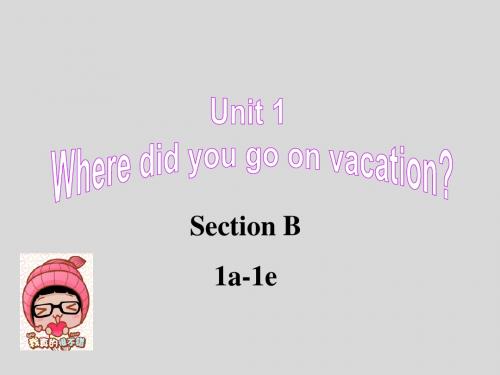
Did he do anything special there?
Yes, he fed some hens and saw baby pigs.
Free talk
Where did you go on vacation? How was your trip?Did you enjoy your vacation?
played soccer went to the beach went to the movies stayed at home did some reading studied for the test
Lead in
Class. Where did Bill go on vacation?
He went to a friend's farm.
I went to... Great!/Terrible./Exciting./... Yes, I did./No, I didn't.
exciting
terrible
charming
delicious
relaxing
expensive
Match the words with the pictures 1a below.
三、补全对话。 How was your vacation? A:Hi,Vera. 1.______________________ B:It was great. Where did you go? A:2. _________________ B:I went to Tokyo with my family on vacation. What did you do there? A:Really?Wow!3. _____________________ B:We went to a lot of museums and met many interesting people. Did you go shopping? A:4. ___________________ B:Yes,I did. I bought something nice for my mother. A:5. ______________________ How was the food there? B:It was delicious. I love Japanese food!
【人教版】八年级英语上册 Unit 1 全单元英文教案
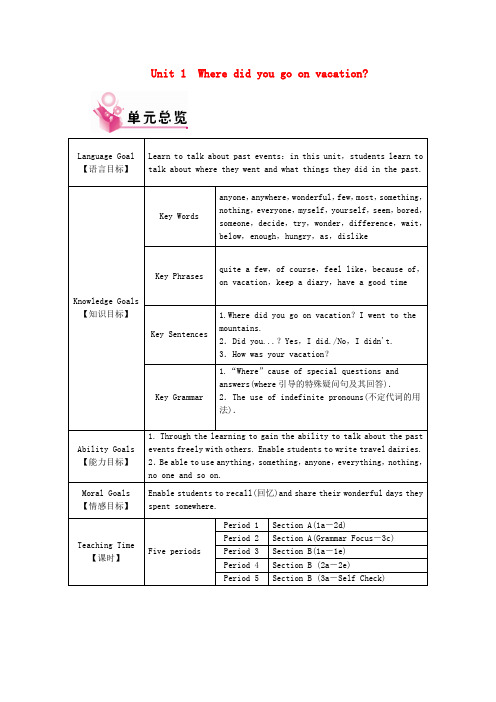
Unit 1 Where did you go on vacation?Language Goal 【语言目标】Learn to talk about past events:in this unit,students learn to talk about where they went and what things they did in the past.Knowledge Goals 【知识目标】Key Wordsanyone,anywhere,wonderful,few,most,something,nothing,everyone,myself,yourself,seem,bored,someone,decide,try,wonder,difference,wait,below,enough,hungry,as,dislikeKey Phrasesquite a few,of course,feel like,because of,on vacation,keep a diary,have a good time Key Sentences1.Where did you go on vacation?I went to themountains.2.Did you...?Yes,I did./No,I didn't.3.How was your vacation?Key Grammar1.“Where”cause of special questions andanswers(where引导的特殊疑问句及其回答).2.The use of indefinite pronouns(不定代词的用法).Ability Goals 【能力目标】1. Through the learning to gain the ability to talk about the past events freely with others. Enable students to write travel dairies. 2.Be able to use anything,something,anyone,everything,nothing,no one and so on.Moral Goals 【情感目标】Enable students to recall(回忆)and share their wonderful days they spent somewhere.Teaching Time 【课时】Five periodsPeriod 1 Section A(1a-2d)Period 2 Section A(Grammar Focus-3c)Period 3 Section B(1a-1e)Period 4 Section B (2a-2e)Period 5 Section B (3a-Self Check)本单元教材以Where did you go on vacation?为中心话题,围绕着描述“过去发生的事情”展开,学习和运用一般过去时态的一般疑问句Did you go/see/buy...?和特殊疑问句Where/What/How...?询问过去的事件,让学生学会谈论和分享过去发生的事件。
八年级英语上册Unit1WheredidyougoonvacationSectionB1a1e教案新
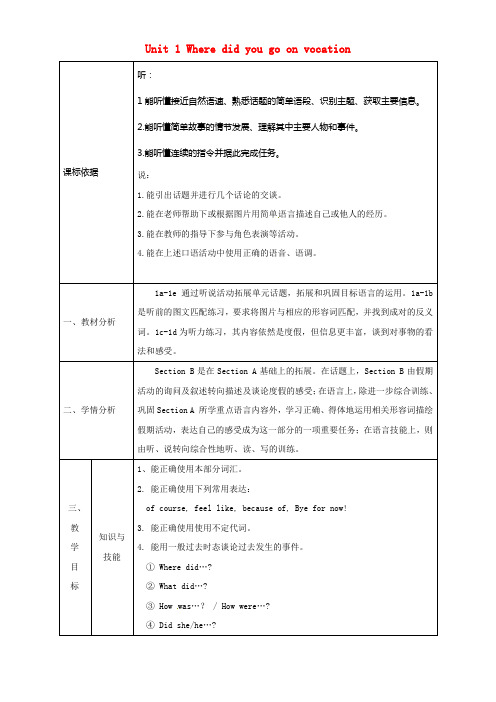
Unit 1 Where did you go on vocation课标依据听:1能听懂接近自然语速、熟悉话题的简单语段、识别主题、获取主要信息。
2.能听懂简单故事的情节发展、理解其中主要人物和事件。
3.能听懂连续的指令并据此完成任务。
说:1.能引出话题并进行几个话论的交谈。
2.能在老师帮助下或根据图片用简单语言描述自己或他人的经历。
3.能在教师的指导下参与角色表演等活动。
4.能在上述口语活动中使用正确的语音、语调。
一、教材分析1a-1e通过听说活动拓展单元话题,拓展和巩固目标语言的运用。
1a-1b 是听前的图文匹配练习,要求将图片与相应的形容词匹配,并找到成对的反义词。
1c-1d为听力练习,其内容依然是度假,但信息更丰富,谈到对事物的看法和感受。
二、学情分析Section B是在Section A基础上的拓展。
在话题上,Section B由假期活动的询问及叙述转向描述及谈论度假的感受;在语言上,除进一步综合训练、巩固Section A 所学重点语言内容外,学习正确、得体地运用相关形容词描绘假期活动,表达自己的感受成为这一部分的一项重要任务;在语言技能上,则由听、说转向综合性地听、读、写的训练。
三、教学目标知识与技能1、能正确使用本部分词汇。
2. 能正确使用下列常用表达:of course, feel like, because of, Bye for now!3. 能正确使用使用不定代词。
4. 能用一般过去时态谈论过去发生的事件。
① Where did…?② What did…?③ How was…? / How were…?④ Did she/he…?过程与方法通过听说综合训练提高听说综合能力,拓展和巩固目标语言的运用;经历听说综合操练巩固和运用单元目标语言,包括词汇、语法和结构;主要以听力输入和口语输出为主要教学形式,通过综合听说法、小组交流合作法、教师引导法及点拨法,利用多媒体P PT、DVD辅助教学。
- 1、下载文档前请自行甄别文档内容的完整性,平台不提供额外的编辑、内容补充、找答案等附加服务。
- 2、"仅部分预览"的文档,不可在线预览部分如存在完整性等问题,可反馈申请退款(可完整预览的文档不适用该条件!)。
- 3、如文档侵犯您的权益,请联系客服反馈,我们会尽快为您处理(人工客服工作时间:9:00-18:30)。
a
c
e
1b Write Write
words
words on the left. words on the right.
words ________ terrible expensive ________ boring ________
________ delicious cheap ________ exciting ________
Practice
Ask and answer questions about 1e Lisa’s vacation. Begin your questions with:
Where did …? What did…? Did she …? How was …? How were …?
Pair-work
Useful expressions: Where did you go on vacation? How was your vacation? How was the food / people / weather there?
Summary
Summary
1.Words:delicious,exciting,terrible, expensive,cheap,boring 2.Sentences: ①Where did Lisa go on vacation? ②Did she buy anything special? ③Did she buy anything for her best friend? ④Did Lisa like her vacation?
1d Listen again. Fill in the blanks.
What did Lisa say about ...? great the people (really) friendly her vacation _______ _____________ exciting the food _________ delicious the fun park(really) ____________ (very) expensive the stores _______________
Talk about your past events.
Lead in
Look at the pictures below. What do you think of them?
expensive
cheap
delicious
exciting
terrible
boring
Presentation
Unit 1
Where did you go on vacation?
Section B (1a-1e)
学习目标
Key words & phrases:
delicious,exciting,terrible,expensive, cheap, boring
Key sentences:
1. Where did Lisa go on vacation? 2. Did she do anything special there? Did she buy anything for her best friend? Did Lisa like her vacation? 3. Hom. How was the museum? It was boring.
Consolidation
1c Listen. Lisa is talking about her vacation. Answer the questions.
1. Where did Lisa go on vacation? She went to Hong Kong. ___________________________________ 2. Did she do anything special there? What? Yes, she went to a fun park. ___________________________________
A: How was Lisa’s vacation?
B: It was … She went to ...
A: Did she do … there?
B: Yes, she …
A: How was/were the…? B: It/They was/were …
Choose a place to have a trip according the tour guiding, and make a new conversation with your partner.
3. Did she buy anything for her best friend? Yes, she did. ___________________________________ 4. Did Lisa like her vacation? Yes, she did. ___________________________________
Homework
1.Review these sentences: Where did...?Did...? How was/were...? 2.Do the exercises in students' book.
Match the words with the pictures 1a below.
1. _____ f delicious 3. _____ c exciting 5. _____ b terrible b 2. _____ a expensive 4. _____ e cheap 6. _____ d boring f d
Look at the pictures below. Where were they? What happened?
bus trip relaxing
We were on a bus trip. How was the bus trip?
It was relaxing.
museum
boring
